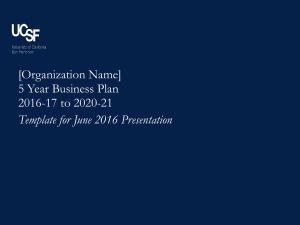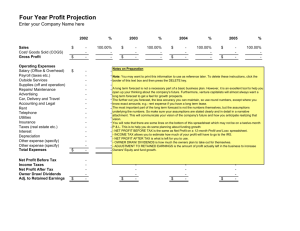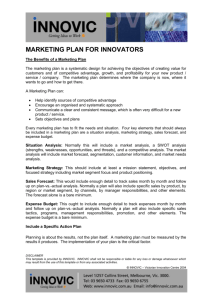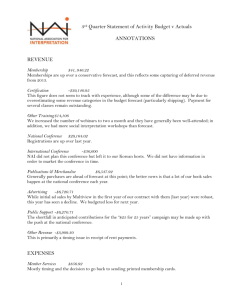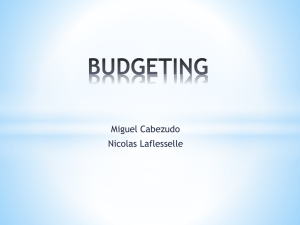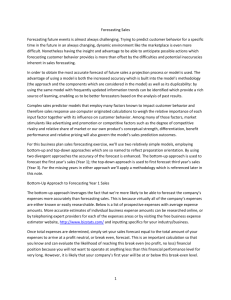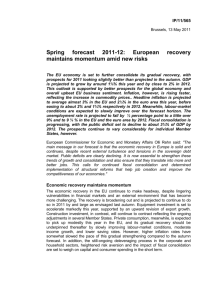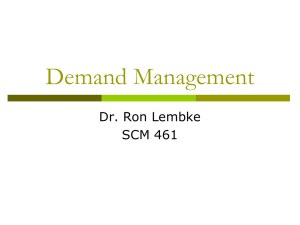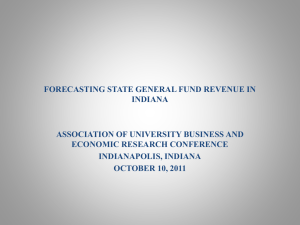Business Plan Template - Budget and Resource Management
advertisement
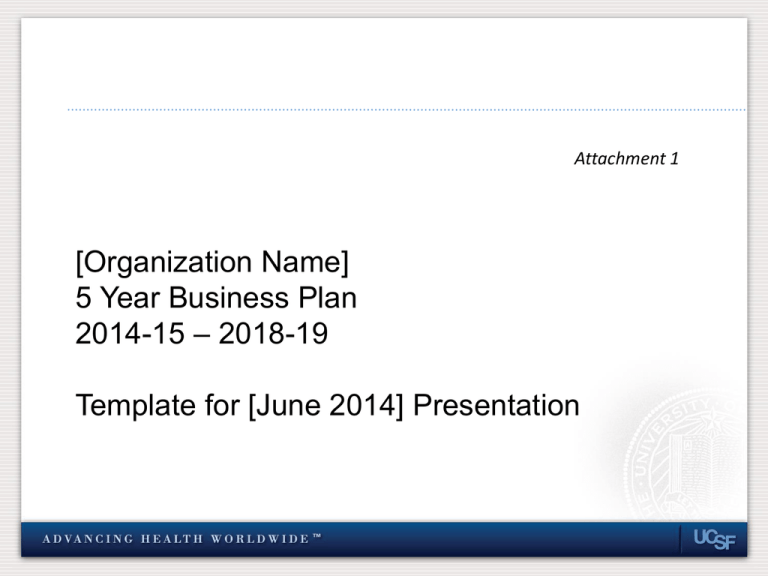
Attachment 1 [Organization Name] 5 Year Business Plan 2014-15 – 2018-19 Template for [June 2014] Presentation Executive Summary Key messages: • Four to six key messages summarizing financial highlights, key opportunities in the next five years, and key challenges in next five years 2 Organizational Overview 2013-14 Accomplishments • • • • Key highlights of service improvements New revenue streams Collaborations Completion of strategic initiatives 2014-15 Organizational Highlights • Proposed change in service – increase/decrease or new service • Re-organization plans • Key areas of focus and links to strategic initiative implementation 3 Current state: Strengths, issues, opportunities Strengths Issues or concerns • Identify the most important issues related to the teaching, research, and clinical mission • Include key internal issues related to personnel, retention, and succession planning. Opportunities 4 Strategic vision for the organization Education Research Clinical – Patient Care People • What does success look like? Highlight aspirational goals? What is the organization trying to achieve? • Include key strategic initiatives included in your planning horizon • Highlight how the strategic initiatives enable revenue enhancement, expense reduction, or program improvement Finance 5 Financial forecast: five year view (Note: For the 2014-15 planning cycle, you may choose to limit your forecast through 2015-16 for the Chancellor’s retreat. However, please provide the full, five-year forecast by the August 7, 2014 deadline.) Key Messages Here • • • • • • 2014-15 revenue profile – pie chart 2014-15 expense profile – pie chart Revenue and expense trends (2013-14 projected actual and 2014-15 – 2018-19 projected) - line chart (revenue, expense, net income (revenue less expense) Reserve summary – committed/restricted and unrestricted reserves as of June 2013, projected June 2014 to June 2019 FTE current and projected Include potential upside opportunities and downside risks along with their corresponding financial implications • Projections should be realistic and include current activities, approved funding, and program changes • Projections should include Budget Office assumptions for salary and benefit increases • Include current initiatives for expense reduction or revenue enhancement • Projections will ideally result with higher revenues than expenses but in some cases may result in a gap between revenues and expenses 6 Potential strategies to reduce gap (revenue growth or expense reduction) not included in financial forecast Initiative Description Financial Impact (one time and on going) Implementation Timeline Implementation Lead Comments Initiative 1 Initiative 2 Etc… • Include initiatives that could be implemented to either reduce expenses or grow revenue. Provide a description of the opportunity, resources required to implement, an implementation plan with milestones, financial impact – both one time and ongoing. • Identify issues that need to be addressed for a successful implementation. • Identify key risks and options to reduce implementation risks. 7 Strategic initiatives to support UCSF mission (not included in financial forecast) Initiative Description Financial Impact /Cost Implementation Timeline Implementation Lead Comments Initiative 1 Initiative 2 Etc… • Identify potential projects that are not in the Financial Forecast that will be key to achieving the strategic priorities of the organization. • Describe how the initiative supports UCSF’s Mission and Goals • Provide operational and financial metrics to assess the impact of the opportunity. • Provide other key information including financial impact/cost, implementation timeline, lead in implementation, resources required, implementation risks and mitigation plans to reduce the risks. 8 Appendix 9 Five year financial forecast – assumptions Key assumptions including: • • • • • • • tuition and fee adjustments number of students number of faculty federal funding private funding clinical practice metrics etc . . . Sensitivity analysis: • • Potential upside/downside to forecast with estimated impact For the main risks, identify potential mitigation plans to reduce the risk 10
